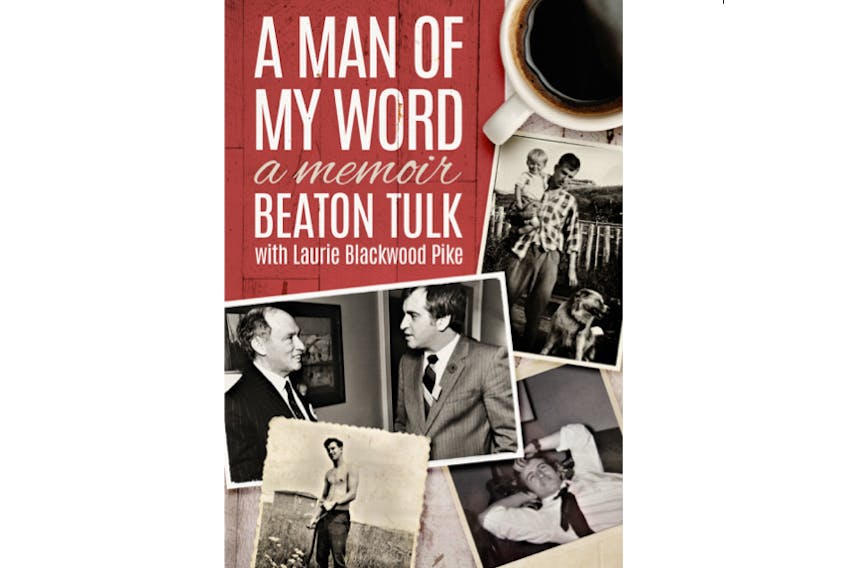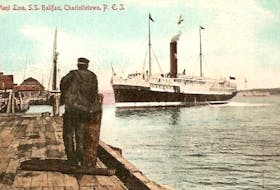A Man of My Word: A Memoir
By Beaton Tulk, with Laurie Blackwood Pike
Flanker Press
$19.95 230 pages
Beaton Tulk prepared this manuscript with a collaborator, and “with the way I ‘talks,’ I know it was not easy listening to the tapes [Laurie Blackwood Pike] used to interview and organize my rambling ways.” Maybe so, but the process has resulted in a nicely conversational read.
The text runs chronologically, sign-posted by matter of fact designations, like “Childhood,” or “University and Teaching Career.” (By the way has anyone ever discovered why so many N.L. politicians have a teaching background? But I digress). These are interspersed with chapter subheadings that sometimes denote news headlines: ending denominational education, for example; “It cost us seats … but it was the right thing to do”; or “Prince Philip.”
Tulk opens with an anecdote about sharing breakfast with his elderly parents. His father, Japhet, asks for marmalade. Tulk is confused. He thought his father despised marmalade. “‘But you wouldn’t touch it when I was a youngster.” His mother, Sadie, explains, “He only said that so there would be more for you guys.” (Tulk had an older sister, Blanche.)
The Tulks lived in Ladle Cove on N.L.’s northeast coast which “at its biggest had a population of 225 -250.” His father started work at 14 and at one point ran a sawmill. The family was United Church (“I didn’t even meet a Roman Catholic until I went away to university”).
They were a hard-working, self-sustaining crew.
“When I was about eight, I got a horse — a pony, I suppose you’d say, but either way, June was mine! I had a dog, too, named King. He was big, about fifty pounds, with long brown hair. Water dogs, we called them then. They’d go into the water to retrieve ducks for you when you were hunting. My mother kept the goats for milk.”
These early recollections are packed with events, and character-rich (“Let every barrel stand on its own bottom,” is one of his mom’s sayings, in discouraging gossip.) And that’s before he moves on to his political career — which led to his meeting Prince Philip in 1997.
As Minister of Wildlife, he was invited to a WWF conference in Halifax, and seated next to the prince. “We talked away for a couple of hours — however long the meal lasted — about everything you can think of, even a bit about wildlife.”
Tulk didn’t expect to ever speak to him again, but just a few weeks later the Prince and Queen Elizabeth were on a Royal tour of the country and the Prince asked that Tulk be the one to present a gift of a painting.
“What do you and the Prince have going?” a surprised assistant to Premier Brian Tobin asked. Tulk modestly replied that they were “just old buds”; still, he later received a note inviting him to Buckingham Palace should he find himself in London.
Tulk has lots of good stories and memories, but some bad ones, too. One chapter is titled “Five Months of Hell.” In 1998 he first lost his sister Blanche to cancer, and then was embroiled in the scandal of his professional life. A businessman named John Woodrow, who had opened a private college in St. John’s to train paralegals, accused Tulk (and various others) of taking bribes. Tulk immediately went to Tobin and resigned. After many stressful weeks, the RCMP, which had investigated the case, announced his name was cleared.
Reputation restored, Tulk became premier in 2000 when Tobin resigned to run federally.
“It all happened so fast, I don’t remember if we even had a vote, but the caucus agreed with {Tobin} that I should take over his position as premier.”
One stipulation was that Tulk not run for party leadership himself, which Roger Grimes won (and then the next provincial election). Tulk, first elected in 1979, then tried for a federal seat, but was unsuccessful.
This is all denser and livelier than the slightly humdrum title promises. It has traction, if not friction — Tulk seems to have liked most everyone he ever met. Tulk may not have been as prominent as some of his cohort, but he was on scene for lots of significant issues and developments, and he provides colour and detail.
Words are accompanied by illustrations of black and white photos, and the book closes with an Afterword that includes a bit of a family tree, a list of all House of Assembly members whose years of service tallied with his, and an Index.
Joan Sullivan is editor of Newfoundland Quarterly magazine. She reviews both fiction and non-fiction for The Telegram.









